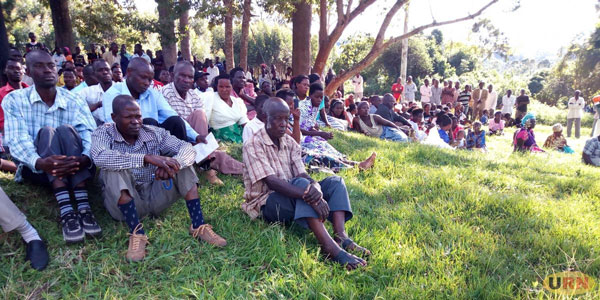
Kyotera, Uganda | THE INDEPENDENT | Local leaders in Kyotera district are calling for the opening of fresh boundaries on the former Sango-bay Sugar estates before the implementation of the National Oil Palm project in the area. They argue that the project implementers have crossed beyond the original boundaries of the government estate and encroached upon privately owned land, leading to conflicts with the community.
In March 2022, the government initiated the process of repossessing the former Sango-bay sugar estates located in Kakuuto, Kabira, Kyebe, and Mutukula sub-counties of Kyotera district. The aim was to convert the land into Oil Palm tree plantations as part of the National Vegetable Oil Development program.
As a result, nearly 10,000 residents who were occupying the 247 square miles of land were ordered to vacate so that it could be given to an investor for Oil Palm cultivation. The land had been leased to an Asian firm in 1936 for sugarcane growing and sugar production until the company collapsed in the 1970s.
According to the government, the current occupants of the land, who have used it for animal grazing, crop cultivation, and settlements, are considered encroachers who took advantage of the collapse of the Sango-bay Sugar Estates Limited in 1972. However, local leaders, led by Francis Kizza, the Chairperson for Kyebe Sub-county, argue that the repossession process has been flawed and needs rectification before the project begins.
Kizza claims that the individuals currently clearing the land, backed by the police and the army, have unknowingly encroached upon private plantations, annexing them to the targeted Sango-bay estate. He demands that the government conducts a fresh opening of the boundaries to determine the actual size of its land and prevent violations of genuine private landowners in the area.
Kizza and other local leaders are considering petitioning Parliament and the President to halt the ongoing land clearing until the boundaries are reopened. While they acknowledge the economic potential of the proposed oil palm project, they express concerns about the potential disadvantages it may bring to the local community if not properly planned.
In April last year, the Ministry of Lands, Housing, and Urban Development stated that only 300 individuals qualified as bonafide occupants and would receive compensation from the government. However, Richard Kalanzi, the Chairperson for Kabira Sub-county, disputes the verification process, claiming it was hastily conducted without involving local leaders.
Consequently, many affected individuals are reportedly seeking refuge across the border in Tanzania after failing to find alternative land in Uganda. Kalanzi appeals to the government to develop a proper plan for resettling them so they can also participate in the project as out growers.#
******
URN
 The Independent Uganda: You get the Truth we Pay the Price
The Independent Uganda: You get the Truth we Pay the Price


